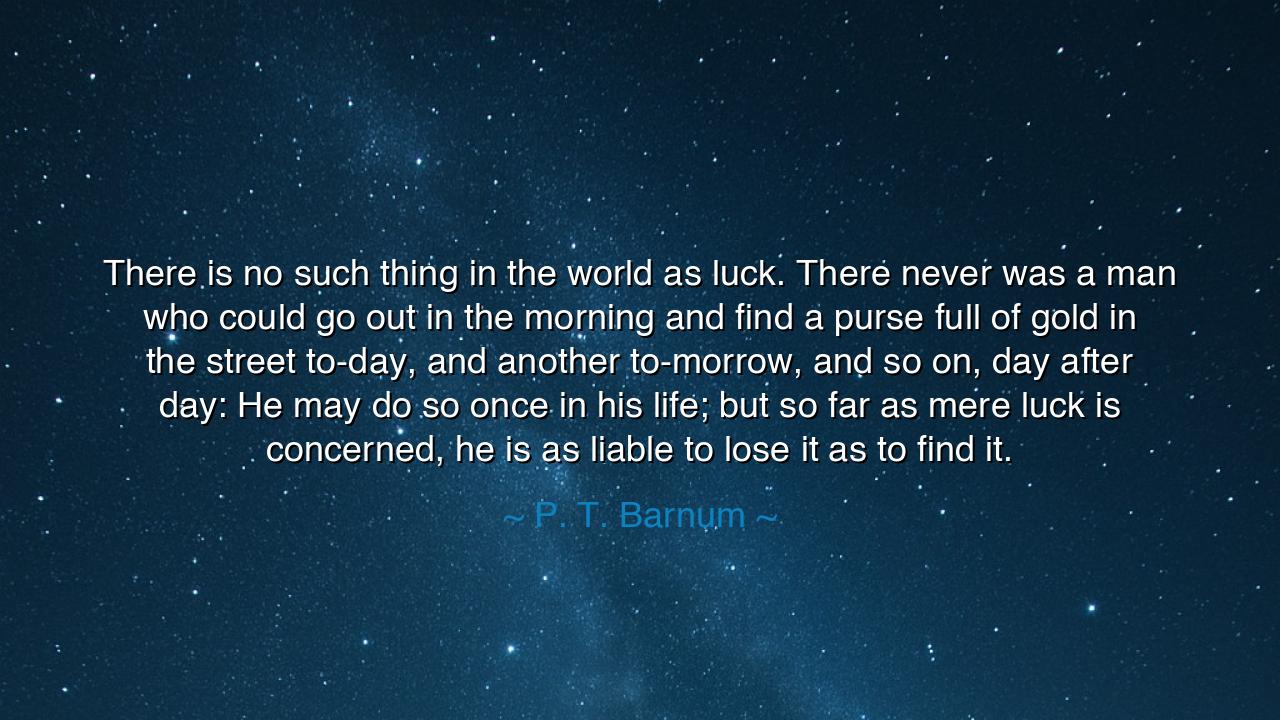
There is no such thing in the world as luck. There never was a
There is no such thing in the world as luck. There never was a man who could go out in the morning and find a purse full of gold in the street to-day, and another to-morrow, and so on, day after day: He may do so once in his life; but so far as mere luck is concerned, he is as liable to lose it as to find it.






Children, gather close and listen carefully, for I bring to you a wisdom that will guide you through the uncertainties of life. In the words of P.T. Barnum, we find a profound truth that speaks to the very heart of human striving: "There is no such thing in the world as luck. There never was a man who could go out in the morning and find a purse full of gold in the street to-day, and another to-morrow, and so on, day after day: He may do so once in his life; but so far as mere luck is concerned, he is as liable to lose it as to find it." These words are a call to understand the true nature of success—not as a stroke of chance, but as the result of effort, discipline, and wisdom.
Barnum’s words remind us that life is not a game of chance, where fortune favors the random few. The idea of luck—that a person might stumble upon success or wealth without effort—is a fleeting illusion. True success comes not from finding a purse of gold on the street, but from the daily actions we take, the choices we make, and the principles we live by. The pursuit of greatness is not reliant on luck, but on work, consistency, and the cultivation of wisdom. Barnum’s insight is a reminder that we must actively shape our own destinies through the actions we take, and not sit idly, waiting for luck to find us.
Consider, children, the story of King Midas, whose greed for wealth led him to ask the gods for the ability to turn everything he touched into gold. At first, this seemed a blessing, but soon it became a curse, for even his food and loved ones turned to gold at his touch. Midas’ story is a tragic example of how desire for wealth and a belief in luck or chance can lead to ruin, if not guided by wisdom. Unlike the unfortunate King Midas, those who understand the power of steady effort, like Barnum, know that true wealth—whether in material form or spiritual—comes from honesty, hard work, and perseverance, not from the fleeting whims of fortune.
Think also of the great philosophers such as Aristotle, who warned against the dangers of living life based on chance or fleeting desires. Aristotle spoke of virtue as the key to true happiness, saying that it is not by chance that we lead good lives, but by actively choosing to live virtuously. He taught that one must cultivate wisdom, practice self-control, and make thoughtful decisions in order to achieve fulfillment and success. Barnum’s rejection of luck is in harmony with this ancient wisdom. It is not mere chance, but the deliberate choices we make each day that shape our lives and destinies.
The lesson here, children, is one of self-reliance and wisdom. While luck may offer a fleeting moment of success, it is effort and intention that create lasting achievement. If a man were to find a purse full of gold once, it would be fortune, not skill or preparation. But should he live his life by wisdom and discipline, he will build something far greater than luck—he will build true wealth, not just in gold, but in character, resilience, and purpose. Barnum teaches us that success is not found in the vagaries of fortune, but in the choices we make, day by day, through our actions.
Consider the example of Thomas Edison, whose path to success was not paved by lucky breaks, but by years of hard work and failures. Edison is said to have made over 1,000 unsuccessful attempts to create the lightbulb before succeeding. While others might have seen his failures as a sign of bad luck, Edison saw them as valuable lessons on the road to success. His belief in consistent effort, in shaping his own fate, led him to create one of the most transformative inventions in human history. Edison’s success was not the result of some lucky moment, but of tireless work, determination, and the refusal to rely on fortune.
The lesson, children, is clear: do not wait for luck to shape your life. Understand that success is the result of hard work, focus, and intention. Barnum’s rejection of luck speaks to the deeper truth that while fortune may come once, it is the actions we take each day that lead to true success. So do not look for luck in the streets, but look within. Cultivate your skills, your mind, and your character, and you will find that the true wealth of life is not in the things we stumble upon, but in the things we build with our own hands.
So, I charge you now, young ones, to embrace the teachings of Barnum and the ancients who understood that success is not a matter of chance, but a matter of choice. Work tirelessly, pursue wisdom, and build your own destiny, for in this lies the true wealth of life. Do not wait for luck, but take the reins of your future and forge your own path with courage and determination. Let your actions be the force that shapes your success, for that is the true power, the power that no amount of luck can ever replace.






AAdministratorAdministrator
Welcome, honored guests. Please leave a comment, we will respond soon